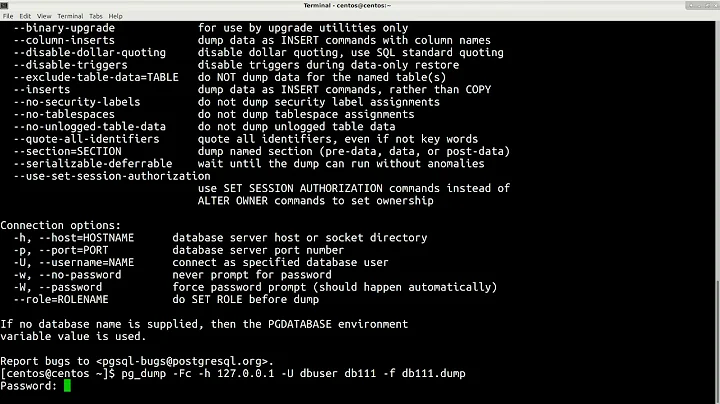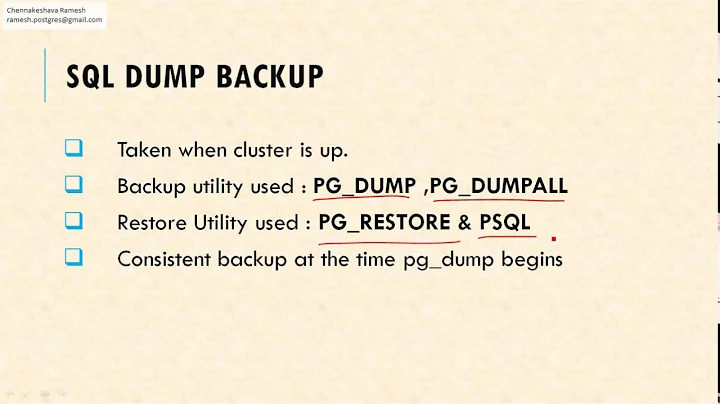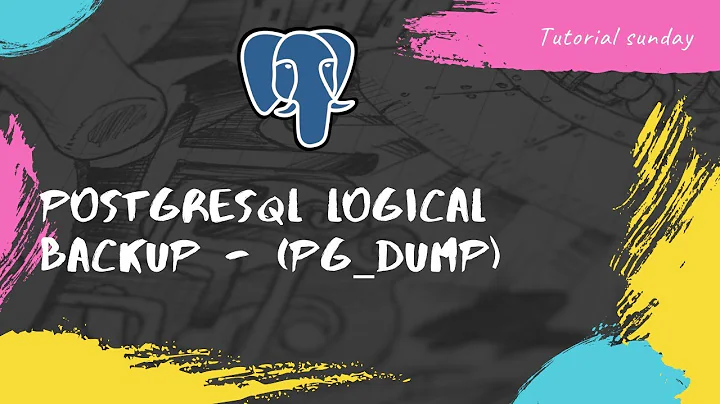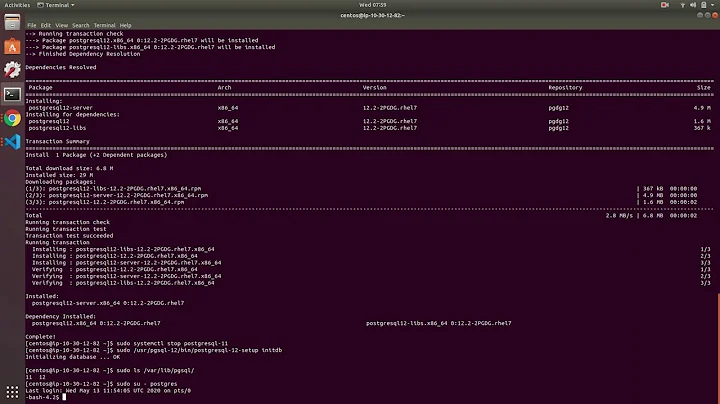Postgresql 9.2 pg_dump version mismatch
Solution 1
You can either install PostgreSQL 9.2.1 in the pg_dump client machine or just copy the $PGHOME from the PostgreSQL server machine to the client machine. Note that there is no need to initdb a new cluster in the client machine.
After you have finished installing the 9.2.1 software, remember to edit some environment variables in your .bash_profile file.
Solution 2
-
Check the installed version(s) of pg_dump:
find / -name pg_dump -type f 2>/dev/null -
My output was:
/usr/pgsql-9.3/bin/pg_dump /usr/bin/pg_dump -
There are two versions installed. To update pg_dump with the newer version:
sudo ln -s /usr/pgsql-9.3/bin/pg_dump /usr/bin/pg_dump --force
This will create the symlink to the newer version.
Solution 3
I encountered this while using Heroku on Ubuntu, and here's how I fixed it:
Add the PostgreSQL apt repository as described at "Linux downloads (Ubuntu) ". (There are similar pages for other operating systems.)
-
Upgrade to the latest version (9.3 for me) with:
sudo apt-get install postgresql -
Recreate the symbolic link in
/usr/binwith:sudo ln -s /usr/lib/postgresql/9.3/bin/pg_dump /usr/bin/pg_dump --forceThe version number in the
/usr/lib/postgresql/...path above should match theserver versionnumber in the error you received. So if your error says,pg_dump: server version: 9.9, then link to/usr/lib/postgresql/9.9/....
Solution 4
Macs have a builtin /usr/bin/pg_dump command that is used as default.
With the postgresql install you get another binary at /Library/PostgreSQL/<version>/bin/pg_dump
Solution 5
You can just locate pg_dump and use the full path in command
locate pg_dump
/usr/bin/pg_dump
/usr/bin/pg_dumpall
/usr/lib/postgresql/9.3/bin/pg_dump
/usr/lib/postgresql/9.3/bin/pg_dumpall
/usr/lib/postgresql/9.6/bin/pg_dump
/usr/lib/postgresql/9.6/bin/pg_dumpall
Now just use the path of the desired version in the command
/usr/lib/postgresql/9.6/bin/pg_dump books > books.out
Related videos on Youtube
Chris Colla
Updated on April 04, 2022Comments
-
Chris Colla about 2 years
I am trying to dump a Postgresql database using the pg_dump tool.
$ pg_dump books > books.outHow ever i am getting this error.
pg_dump: server version: 9.2.1; pg_dump version: 9.1.6 pg_dump: aborting because of server version mismatchThe
--ignore-versionoption is now deprecated and really would not be a a solution to my issue even if it had worked.How can I upgrade pg_dump to resolve this issue?
-
Craig Ringer about 11 yearsLocation will vary depending on how PostgreSQL was installed (EnterpriseDB installer, MacPorts, Homebrew, etc), but the gist of the answer - that the user probably has the right version already installed - is certainly right.
-
Craig Ringer about 11 yearsTip: in
Terminal.app,find / -name pg_dump -type f 2>/dev/null -
Craig Ringer about 11 yearsNonono, don't just delete package managed files! If it's in
/usr/(rather than/usr/local/,/home/or/opt/, where deleting things is generally OK) you really need to use the package manager -rpm&yumordpkgandapt-getoraptitude, distro-depending. Either uninstall the package withrpmor alter yourPATHenvironment variable in your.bash_profileso that the newer version is found first. If you're in doubt about something being under package management, userpm -qf /path/to/file(RPM) ordpkg -S /path/to/file(dpkg) -
Alex Weber almost 11 yearsIn my case, opening .bash_profile and adding "export PATH=/Applications/Postgres.app/contents/macos/bin:$PATH" did the magic.
-
Seth about 10 yearsThis only happens when you upgrade PostgreSQL. I just did a fresh install of the OS and didn't have any problems with this.
-
IanBussieres almost 10 yearsFor anyone wondering, this solution applies to non-Heroku Ubuntu as well.
-
Arthur over 9 yearsAccording to what has been said in this answer, it's a pretty bad idea as well.
-
Seth over 9 yearsThat answer recommends removing software by deleting a folder. Here we're just recreating a symbolic link.
-
Yo Ludke about 9 yearsPerfect! Recreating the symbolic link after postgres upgrade
-
Franco over 8 yearsWorked perfectly for me. I never imagined that the version mismatch was caused by /usr/bin/pg_dump which has nothing to do with my fresh PostgreSQL update. I'm fine with the ln solution.
-
VaTo over 7 yearsI'm using centos and by doing yum postgresql I get that I have the latest postgresql version installed. And I still get that error :( So it doesn't work for me.
-
Seth over 7 years@VaTo see the additional paragraph I added to the 3rd step.
-
Seth over 7 years@VaTo what is the full text of your error? Since you're on CentOS, replace that path with the path to your installation of PostgreSQL.
-
VaTo over 7 yearsI had to get a pg_dump newer version from another machine and then copy that pg_dump file into this machine and now it works.
-
 Davidson Lima almost 6 yearsFor CentOS users (my version is 6.9 Final):
Davidson Lima almost 6 yearsFor CentOS users (my version is 6.9 Final):sudo /usr/pgsql-<version>/bin/pg_dump <database-name> -U <username> -h localhost -
Obromios over 5 yearsIt was much quicker for me to find the versions using
locate pg_dump -
Poutrathor about 5 yearsIMO, you should not add
2>/dev/nullsince that will throw out the ERROR stream rather than printing it to the console. I think one should want to see any errors happening, except some rare cases. For example, in my case, it reminds me that I was not root thus failing to see some directories where the newer pg_dump version was installed. In general, don't remove errors. -
 Deepak Mahakale almost 5 years@jDub9 what version did you use while taking the dump? Make sure you are using the same
Deepak Mahakale almost 5 years@jDub9 what version did you use while taking the dump? Make sure you are using the same -
Andrius over 4 yearsThis is very useful. As I was confused why
pg_dumpwas not working on one of my clusters. Turns out, it was using default Postgresql version, when one of my clusters was upgraded to newer version. Specifying cluster, solved the problem. -
vinh over 4 yearsThis won't replace the existing executable files on your computer, so you'll need to explicitly use the new version of pg_dump, e.g. /usr/lib/postgresql/9.6/bin/pg_dump or make a new shortcut e.g. /usr/bin/pg_dump96
-
rado about 4 yearsI didn't have to explicitly use the new it picked it up.
-
rogerdpack over 3 yearsYou can sometimes (easily) get particular versions from it too do
brew search postgresto see them all. -
mikebridge about 3 yearsThis is by far the simplest and most flexible solution.
-
moodboom almost 3 yearsAgreed, but at least my package manager, apt in Ubuntu 20.04 using the "official" postgres repo, leaves this bad /usr/bin/pg_dump link from an old install and will not refresh it no matter what I ask it to do (and I asked it to do a LOT before giving up).
-
 thanos.a over 2 yearsThe first time it needs
thanos.a over 2 yearsThe first time it needssudo updatedbto create the locate db -
 Lahiru Jayaratne over 2 yearsThis worked just fine!
Lahiru Jayaratne over 2 yearsThis worked just fine! -
John Doe over 2 yearsThis command was useful in my case:
docker run --net host --rm -i postgres:14.1 pg_dump -h 127.0.0.1 -U postgres dbname > pg.dump.schema.sql -
Zach Milan over 2 yearsFor those using newer Macs (with Zsh instead of Bash), place the above in your
.zshrcfile. -
Gunar Gessner about 2 yearsHere's a function to add to your
.bashrc:pg_dump-version() { docker run --rm "postgres:${1}-alpine" pg_dump ${@:2} }— e.g.pg_dump 14 $PG -
 Abhinav Keshri about 2 yearsYou should have docker installed on your system to proceed with this solution.
Abhinav Keshri about 2 yearsYou should have docker installed on your system to proceed with this solution.









